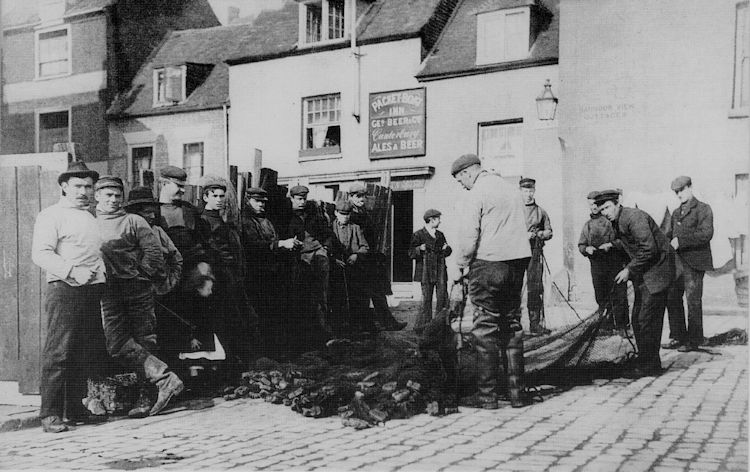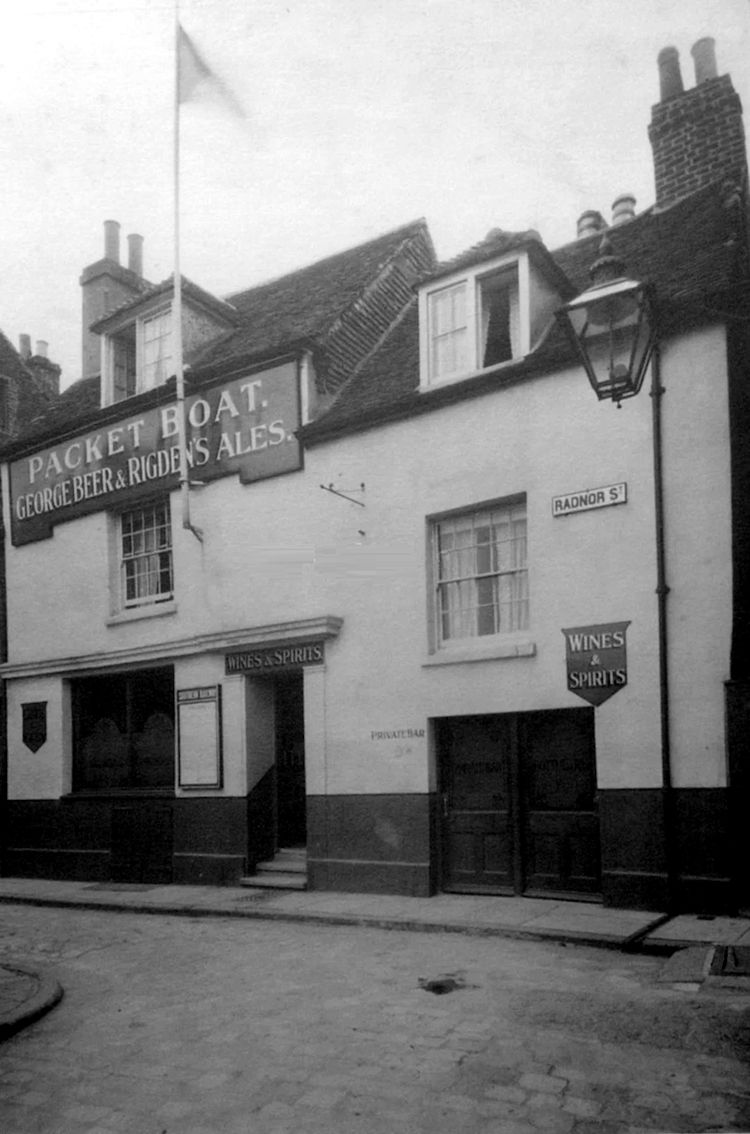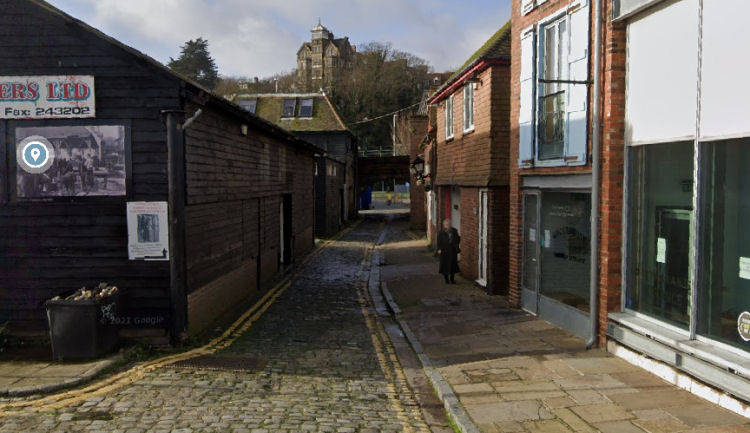|
59 Radnor Street
Folkestone

Above photo, circa 1910. |

Above photo, circa 194, kindly sent by Rory Kehoe. Until 1922, the
pub was one of about 120 pubs in East Kent (6 of them located in
Folkestone) which were tied to George Beer's Star Brewery,
Canterbury. After George Beer's January 1922 merger with Faversham
brewers, W.E. & J. Rigden, their combined estate of about 250 tied
houses was owned and supplied by George Beer & Rigden's Brewery,
Faversham and the Star Brewery was closed. This photograph is almost
certainly one of the series commissioned by George Beer & Rigden
showcasing all their pubs in their new livery and signage. |

Above Google image December 2022. Showing what is left of Radnor Street. |
Originally called the "Fishing
Boat" or "Fisher Boat," or indeed "Fishing Smack."
The licence from this was surrendered in 1935 and transferred to the "East
Cliff Pavilion."
|
Folkestone Chronicle 19 December 1857.
Wednesday December 16th:- Before R. W. Boarer esq., and G. Kennicott esq.
Special Sessions for transferring licences.
The licence of the Packet Boat was transferred from Richard Boorn, to
John Boorn.
|
|
Southeastern Gazette 22 December 1857.
Wednesday: Before R.W. Boarer and G. Kennicott Esqs.
The licence of the "Packet Boat" was transferred from Richard Boorn to
John Boorn.
|
|
Kent Herald 24 December 1857
Special Sessions: The license of the Red Cow was transferred from William
Prebble, deceased, to his widow, Charlotte Prebble;
The Packet Boat, from
Richard Boorn to John Boorn.
|
|
Kentish Gazette 22 December 1857
At the special sessions for transferring licences on Wednesday, the
license of the "Packet Boat" was transferred from
Richard Boorn to John Boorn.
|
|
Southeastern Gazette 1 March 1859.
Wednesday: Before the Mayor, W. Major and J. Tolputt, Esqs.
Jacob Morrick, a German, and servant to Capt. Clark, of 100 Regt., at
Shorncliffe, was charged with stealing £5 12s. 6d. from his master’s
desk in one of the huts.
Prisoner was taken in the Packet Boat Inn, Radnor Street, by P.C.
Ovenden, and the whole of the money was found on him.
Three months’ hard labour.
|
|
From the Folkestone Chronicle 23 March, 1861.
COUNTY COURT INSOLVENT
Richard Boorn, an insolvent, appeared to pass his first examination,
supported by Mr. Bedford. He was opposed by Mr. John Minter, on behalf
of Mr. George Conley, for a debt of £16 11s. 9d. Insolvent was examined
by Mr. Minter, who failed to elicit that he had any effects. Debts £225.
He passed his first examination.
Note: Boorn had been landlord of the "Packet
Boat," Radnor Street 1851-57. Strangely, it seems that he carries on
with the "Alma," Cheriton Road (1855-64) and returns to the "Packet
Boat" (1861-69) despite this insolvency! Jan Pedersen.
|
|
Folkestone Observer 23 March 1861.
County Court.
Insolvent Case.
Friday March 22nd:- Before C. Harwood Esq.
Richard Boorn came up for his first examination. Mr. Bedford appeared in
support, and Mr. Minter for Mr. George Conley, who was entered for £16
11s. 9d. Insolvent had keot an inn in Radnor Street, but his uncle dying
and leaving him a legacy of £1,500, he had paid £991 19s. 8d. to old
creditors, and bought the schooner Mary for £500, afterwards selling her
for £110. The present total amount of debts was £255 17s. 0 1/2d; no
assets. He had been for the last four years out of business. The
insolvent passed.
Note: Boorn had been landlord of the Packet Boat, Radnor Street. Also
listed at Alma, Cheriton Road.
|
|
From the Folkestone Chronicle 27 April, 1861.
COUNTY COURT INSOLVENT
Richard Boorn. This insolvent came up for his final examination. Mr.
Minter withdrew his opposition upon His Honour allowing the insolvent to
amend his schedule, by inserting a reversionary interest he was entitled
to; which having been done, he passed.
Note: Boorn had interests in both the
"Packet Boat," Radnor Street, and the "Alma,"
Cheriton Road. Jan Pedersen.
|
|
Folkestone Chronicle 27 April 1861.
County Court.
Wednesday April 24th:- Before Charles Harwood Esq., Judge.
Richard Boorn. This insolvent came up for his final examination. Mr.
Minter withdrew his opposition upon His Honour allowing the insolvent to
amend his schedule, by inserting a reversionary interest he was entitled
to; which having been done, he passed.
Note: Boorn had interests in both the Packet Boat, Radnor Street, and
the Alma, Cheriton Road.
|
|
Folkestone Chronicle 9 August 1862.
Birth: On Tuesday, August 5th, at the Packet Boat Inn, Radnor
Street, the wife of Mr. John Boorn, of a son.
|
|
From the Folkestone Chronicle 12 November, 1864.
NEW LUGGER CELEBRATIONS
On Thursday evening Mr. John Boorn of the "Packet Boat Inn" invited a
few friends to a quiet little supper to celebrate the launch of a new
lugger he has just finished, and the first he has finished since he
entered into the business of a boat builder. The vessel was launched in
the afternoon of the same day, and was named the Blair Athol. It is to
be hoped that she will be as successful in her trips as her namesake,
the celebrated racehorse. The lugger is a very nice one and from her
lines appears to combine speed with strength.
|
|
Folkestone Observer 22 July 1865.
Tuesday July 18th: Before Captain Kennicott R.N.
George Mercer, charged with being drunk and riotous in Beach Street,
pleaded Guilty.
To a second charge of assaulting P.C. Swain, he pleaded Not Guilty.
P,C, Swain was on duty last evening in the lower part of the town about
half past nine o'clock, when his attention was drawn to a number of
people making a disturbance at the farther end of Radnor Street. He went
there, and found the prisoner and another man fighting. Prisoner had all
his clothes off, except his trousers. His shirt was off. He was drunk.
Witness took the prisoner into custody. On the way to the Station he
tried to escape. Witness kept his hold, and brought him to the station.
Witness could not see the other man. It was dark and he was hustled away
by the people.
Prisoner said he went into the Royal George last evening to have some
beer, and a man wanted to fight him. He left there, and went along to
the Packet Boat, where the man followed him and wanted him again to
fight, but he refused. The man then wanted him to fight for a sovereign.
He (prisoner) came out to go away, but the man came to him and began to
fight, when, of course, he was almost compelled to fight. He did not
resist the police, but in coming up the street his foot slipped, and he
fell down.
The bench fined him 1s. for each of the two offences, with costs, 10s.
in all, or imprisonment for seven days.
|
|
Folkestone Chronicle 29 July 1865.
County Court.
Friday July 28th:- Before C. Harwood.
Alfred Rayment v John Boorn – Claim for £20 10s for liquor supplied to
defendant, a publican in Radnor Street. Mr. Minter appeared for
defendant and stated that his client had a perfect answer to the claim.
The case was adjourned to prove delivery and sale of goods by
plaintiff's partner.
|
|
Folkestone Chronicle 26 August 1865.
County Court.
Friday August 25th:- Before C. Harwood Esq.
Spurrier & Rayment v J. Boorn – This was an action which had been
adjourned from the last court, to recover a sum of £20 14s for goods
sold.
Mr. Minter appeared for the defendant, and said the defendant would
admit having received all the goods charged in plaintiff's bill, but
defendant said he had paid for some of them, and to save time he asked
Mr. Hellensberg to point out what portion of the bill defendant had
paid.
Mr. Hellensberg said he could not do so.
Mr. Minter asked this witness whether defendant was not charged in this
bill for some bottles which he had returned.
Mr. Hellensberg said not to his knowledge.
His Honour gave judgement for the plaintiff for the amount claimed, to
be paid forthwith, with costs.
|
|
Folkestone Chronicle 14 October 1865.
County Court.
Friday October 13th:- Before C. Harwood Esq.
John Boorn v Alfred Rayment – This was a claim for £4 6s 6d for spirits.
Mr. J. Minter appeared for the plaintiff.
The defendant at first said that he did not dispute the claim, but
pleaded that it was constructed under a partnership, and said that the
plaintiff owed him a good deal larger sum of money than he had sued him
for.
Plaintiff, having said he was landlord of the Packet Boat public house,
and was in partnership with defendant as a builder and owner of fishing
boats, but never with respect to the public house. He sold the goods
charged in the account to the defendant, and delivered some of them
himself, and sent the others. He did not claim the money before, because
he owed defendant money, but after defendant sued him at the last court
he made out the bill.
Defendant said the partnership between them commenced in January, 1864.
Never took any money for the sale of spirits. Plaintiff kept the house
and he kept the books. Had advanced money to plaintiff and others on
account of the house. Defendant was examined at length by His Honour as
to the partnership, and defendant said it could be proved by an entry in
the books.
The cash book, day book, and ledger were put in and examined by His
Honour for evidence of the partnership, and two entries for sums entered
in the defendant's name for spirits and beer, to the amount of £109,
were found.
Defendant, cross-examined by Mr. Minter, said he agreed with the
plaintiff as to the partnership about January 1864. He was to have half
of the profits arising out of the public house business. Before the
partnership agreement was made, the plaintiff was greatly embarrassed,
and he offered to find the money to pay off the old debts, on condition
that the whole concern – the boat building, fishery, and public house –
should be thrown into one partnership. He kept the books, but there had
never been any division of profits.
The case came to an end in a rather singular manner. Mr. Minter pressed
the defendant closely in cross-examination, and Mr. Harrison, the deputy
registrar of the court, appealed to His Honour to protect the defendant,
who had no legal adviser, and said that defendant had been advised by
him in the course he had taken, and he was sorry that his position
compelled him to remain silent in a case which he could explain in a few
words.
Plaintiff's attorney said that Mr. Harrison, holding the position he
did, had no right to try to influence His Honour in his decision, and
withdrew the case.
After this His Honour asked a question, when Mr. Minter contended that
as the case, having been withdrawn, was out of court, the plaintiff was
not bound to answer.
His Honour then struck the case out, and Mr. Minter, upon this, took a
non-suit, stating that it was his intention to carry the case into
another court.
|
|
Kentish Gazette 17 October 1865.
Folkestone County Court: The usual monthly sitting of this Court was
held on Friday, at the Town-hall, before Charles Harwood, Esq.,
Judge.
John Boorn v Alfred Rayment: This was a claim of £4 6s. 6d. for
spirits. Mr. J. Minter appeared for the plaintiff.
The defendant at first said that he did not dispute the claim, but
pleaded that it was constructed under a partnership, and said that
plaintiff owed him a good deal larger sum of money than he had sued
him for.
Plaintiff having said he was landlord of the Packet Boat public
house, and was in partnership with defendant as a builder and owner
of fishing boats, but never with respect to the public house. He
sold the goods charged in the account to the defendant, and
delivered some of them himself, and sent the others. He did not
claim the money before, because he owed defendant money, but after
defendant sued him at the last court, he made out his bill.
Defendant said the partnership between them commenced in January,
1864. Never took any money for the sale of spirits. Plaintiff kept
the house and he kept the books. Had advanced money to plaintiff and
others on account of the house. Defendant was examined at length by
His Honour as to the partnership, and defendant said it could be
proved by an entry in the books.
The cash-book, day-book, and ledger were put in and examined by His
Honour for evidence of the partnership, and two entries for | |


